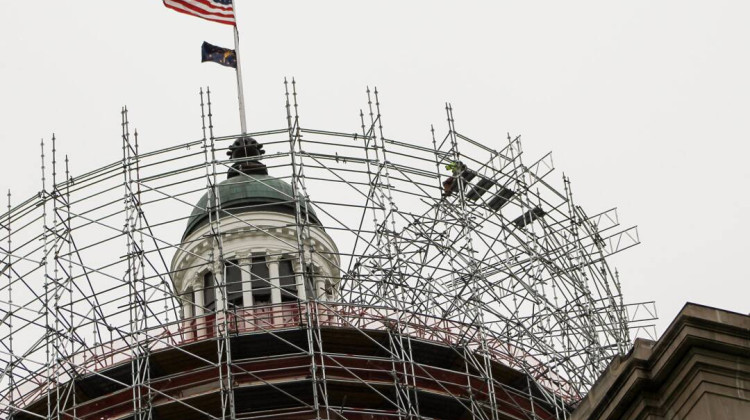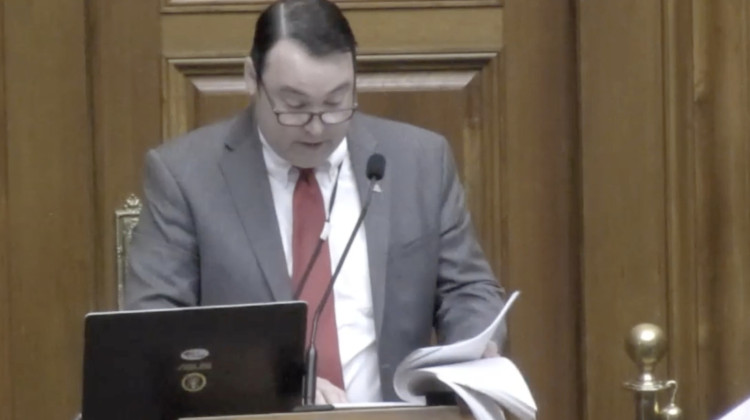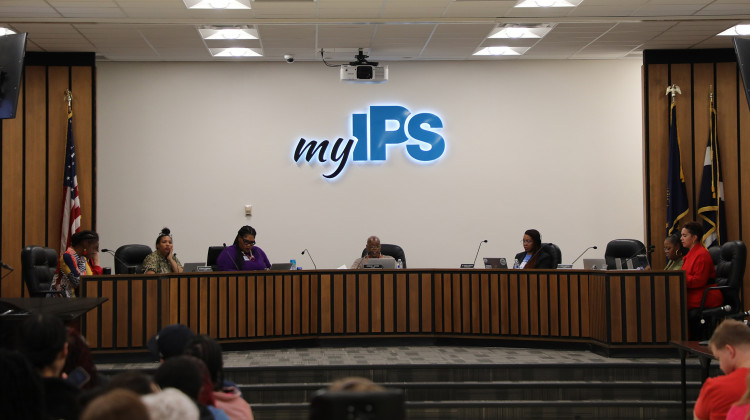Elissa Nadworny, NPR
This spring was supposed to be an exciting time for Xander Christou. He's a senior in high school in Austin, Texas, and was looking forward to all the fun: prom, senior skip day and of course, graduation.
But all that's now out the window. "There's a sense that it's incomplete," says Christou. The school district has closed until April 3 and Christou says he has this feeling that a unique chapter in his life — senior year — is slipping away. "They're just parts that we may never get to experience." One big disruption: any attempt at making plans for next year. "We're in the midst of college decisions," he says, and the coronavirus has "really thrown a wrench into a number of things."
Christou spent most of last fall like many high school seniors: researching and applying to schools. He planned to spend the spring visiting some of the campuses he was accepted to. "Online, the colleges are just names and logos and programs," he says, "nothing will compare to actually being on campus and speaking face-to-face with current students."
But with so many colleges shutting down, all of those visits have been cancelled — including one "candidate weekend" on NYU's Abu Dhabi campus that was all-expense paid. "I was very excited for that," he says, "all I had to do was pack and go to the airport." He would have gotten back home last week. The return flight, without him on it, got cancelled too.
Of course it's more than just the visits — he's waiting on his financial aid offers, too. Money, and how his family is going to pay for college, has become even more important.
The admissions calendar, upended.
College admissions officials around the country are feeling much of the same sense of turmoil as students like Christou. "There's never a good time for a pandemic, but from an admission standpoint, there really couldn't be a worse time," explains Jon Boeckenstedt, who oversees admissions and financial aid at Oregon State University.
For many schools, March and April are when they send out the bulk of acceptances or denials. Financial aid packages are sent out, too — setting up the options for how to pay. Traditionally, May 1 is "decision day," the deadline for students to submit a deposit to hold their spot at a school for the following fall semester. But there's a growing movement this year to shift the deadline back a month, to June 1, to give students and families more time.
"Every parent and student is going through a difficult time just managing to deal with the uncertainty," says Boeckenstedt. "It's really unfair to say, well, we have our deadlines, and come hell or high water, you had better decide by May first."
Oregon State, where Boeckenstedt works, made this change and, as of Wednesday, about 200 other schools had committed to the new deadline, according to ACCEPT, a non-profit that is tracking the change.
"I can't fathom any family in six weeks from now saying, 'I know where my student is going to go to college and I know I can afford it,' " explains Marie Bigham, who runs ACCEPT and advocates for social and racial justice in the admissions process. "There are too many unknowns and storms up in the air. Asking someone to make a really expensive decision in the midst of this is really unfair. It just feels wrong."
Other disruptions complicate admissions
As high schools move to online classes — some for the remainder of the school year — and in some places, letter grades transition to a simple pass or fail, many students are worried about the impact that will have on their high school transcripts. In some places, even getting a final transcript and sending it off to colleges may be difficult, with buildings closed down and office staff working remotely. Guidance counselors are also worried that it may even be hard to confirm that students have actually graduated — since many states rely on end-of-year grades and testing to confirm that status.
Admissions tests have also been jumbled: Advanced Placement (AP) tests will be given online, without multiple choice questions. The ACT has rescheduled the April 4 test to be given in June because of COVID-19, and the College Board has cancelled the SAT test scheduled for May. For now, the SAT scheduled for June is still on the books.
Because of this, a number of schools, including Oregon State and Case Western Reserve University in Cleveland, have announced they will be test-optional for the class of 2021. Experts wonder whether this might be the beginning of many more schools going test-optional.
Case Western had been weighing test-optional policies, thinking that maybe in a year or so they'd make a decision. "Up until a week ago, I would not have predicted where we would ultimately come out on this," says Rick Bischoff, who oversees enrollment there. "But understanding how much turmoil this is injecting into the process, it's just so clearly, in our view, the right thing to do."
Colleges are also bracing for an influx of adjustments to financial aid packages. For many families, their financial situations are changing. Estimates predict that millions of Americans are filing for unemployment this week. And the amount families thought they'd be able to pay come fall might be different now. "This is not unusual for financial aid offices," explains Bischoff, but, "the volume will be unusual."
Virtual tours and video chats
In addition to going test-optional, colleges are bulking up their virtual offerings in lieu of cancelled in-person events. Bischoff acknowledges that, for many students, a personal visit to campus can help in the decision process. Applicants can sit in on a lecture, or meet with current students to get a good feel for how a particular school might "fit." But with these spring events cancelled, schools are moving online — with virtual tours, video chats with professors and online classes.
"Admissions offices are working hard to make sure [that] even if students can't visit, they can still get a sense of a place," explains Bigham, who's been on the phone with admissions officers across the country.
She notes that campus visits have long been a source of highlighting inequity, as wealthy students are often able to take more advantage of these offerings than students who are unable to travel due to finances. Amid COVID-19 social distancing, virtual visits may be "flattening that privilege a little bit."
But, she adds, "that does ignore the real inequity of broadband technology; that it is difficult to find in some communities, and that families can't afford it." Innovations in digital ways to see the campus are exciting — unless you rely on your school or public library to give you access. Those students may still be shut out.
Shut out in another way, too: With high schools closed, it may be harder to stop by a counselor's office or get advice from a teacher regarding college. Even though many colleges are shutting their campuses, admissions and financial aid staff are still working and urge students to ask questions by phone, email or on recently-deployed chat tools on the college's website.
9(MDI4ODU1ODA1MDE0ODA3MTMyMDY2MTJiNQ000))
 DONATE
DONATE






 View More Articles
View More Articles


 Support WFYI. We can't do it without you.
Support WFYI. We can't do it without you.